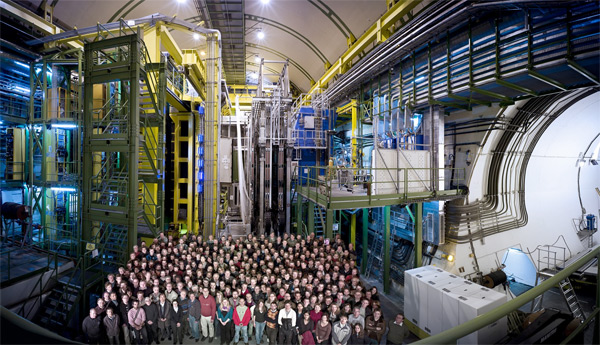
LHCb is an experiment set up to explore what happened after the Big Bang that allowed matter to survive and build the Universe we inhabit today
Fourteen billion years ago, the Universe began with a bang. Crammed within an infinitely small space, energy coalesced to form equal quantities of matter and antimatter. But as the Universe cooled and expanded, its composition changed. Just one second after the Big Bang, antimatter had all but disappeared, leaving matter to form everything that we see around us — from the stars and galaxies, to the Earth and all life that it supports.
-
Observation of orbitally excited Bc+ states
At a CERN seminar today, the LHCb collaboration announced the first observation of orbitally excited Bc+ states, which are composed of a beauty-charm quark-antiquark pair. Within the expected mass range for excited 1P-wave Bc+ states a wide peaking structure was observed in the Bc+γ mass spectrum. The simultaneous discovery of the first heavy quark-antiquark bound…
-
The first dedicated Z-boson mass measurement at the LHC
Today, the LHCb collaboration submitted for publication a paper reporting the first dedicated Z-boson mass measurement at the LHC using Z→μ+μ− decays. The data were recorded in 2016 and correspond to an integrated luminosity of 1.7 fb−1. Around 174×103 Z-boson events were selected. The image below shows the invariant mass of two muons from the…
-
LHCb Upgrade II Scoping Document
The scientific review of the LHCb Upgrade II Scoping Document has been concluded by the LHC Committee, and the CERN Research Board has endorsed their conclusions reaching in this way an important milestone towards the construction of the LHCb Upgrade II detector. A second major upgrade of the LHCb detector is necessary to allow full…
-
The 2025 Breakthrough Prize in Fundamental Physics awarded to the LHCb collaboration
The LHCb collaboration has been awarded yesterday the 2025 Breakthrough Prize in Fundamental Physics, together with the three other CERN’s Large Hadron Collider collaborations: ALICE, ATLAS and CMS, “For detailed measurements of Higgs boson properties confirming the symmetry-breaking mechanism of mass generation, the discovery of new strongly interacting particles, the study of rare processes and…
